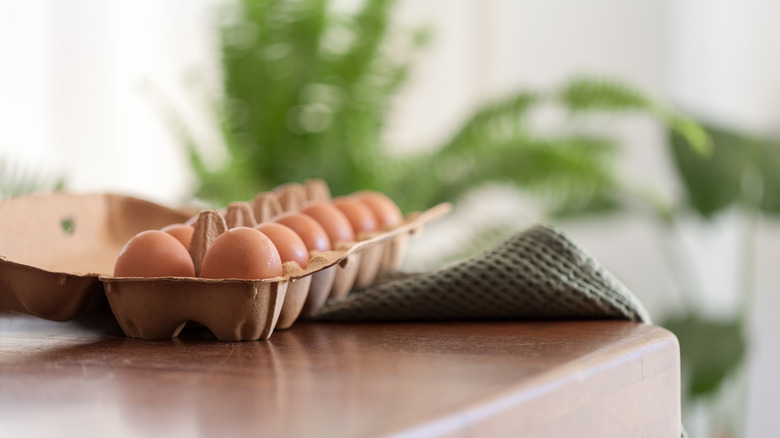How Long Are Eggs Safe For After They're Left Out At Room Temperature?
We've all had those mornings when you are rushing out of the house and forgot to lock the front door, or turn off the lights, or worse yet ... put the eggs back in the fridge. Is that new carton of organic, cage-free eggs you splurged on history? While there's no need to make a dangerous U-Turn and come back home, you've still got a definite time limit.
If left out at room temperature, eggs remain safe to eat for up to two hours before going back in the fridge. Any longer than that, and the eggs are much more prone to developing harmful bacteria such as Salmonella, which can cause foodborne illness. Bacteria thrive in warm, humid areas, so if you live in a humid place and leave your eggs out during the peak of summer, you might be out of luck.
Note that the 2-hour rule only applies if your eggs are already washed. In the U.S., it is customary for eggs to be sold refrigerated, which means that they are pre-washed and no longer have their protective layer on the shell. In Europe and various other countries around the world, however, eggs are often sold unwashed and unrefrigerated. So, if you buy your eggs unrefrigerated or harvest your own eggs from your coop at home, it's no problem to keep your eggs out (unwashed). Just don't forget to wash them before use in order to remove any dirt, feces, or other bacteria.
Other signs it might be time to throw the carton out
If you've been consistent about keeping your eggs in the fridge, you're on the right track to a safe and healthy meal. But that doesn't mean you're in the clear quite yet; there are a few other things to check before diving into your sizzlin' fried egg.
First, before using your eggs (or ideally, before purchasing them at the store), carefully check each one for any cracks or holes. Cracks are an entryway for bacteria to get inside the egg and contaminate it. In this case, toss the egg and move onto the next one. Another simple way to check if your eggs are bad is to smell them. Your eggs should have no distinctive odor when encased in the shell, so you'll have no problem determining which egg is the rotten one if you do sense an odor coming from the carton.
If your egg passes those first two tests, break it open in your bowl or pan (don't forget the eggshells can be used too). Then, check the egg for any pink or iridescent hues – these can be a sign of spoilage. Instead, your egg white should be (you guessed it) white, while the yolk should be a vibrant yellow/orange color. Once your eggs are cooked, enjoy right away or store them in the fridge – just don't leave them out on the counter, again!


